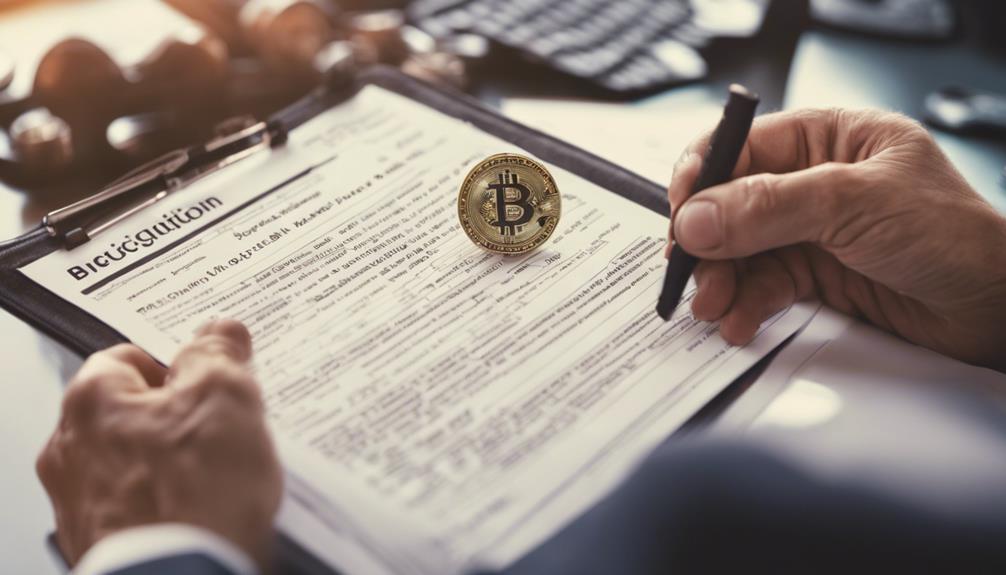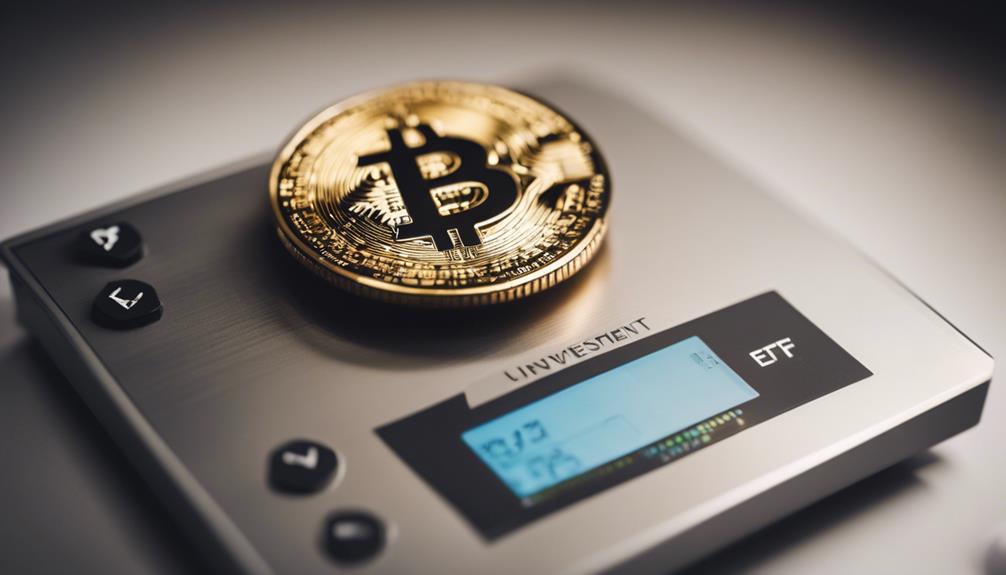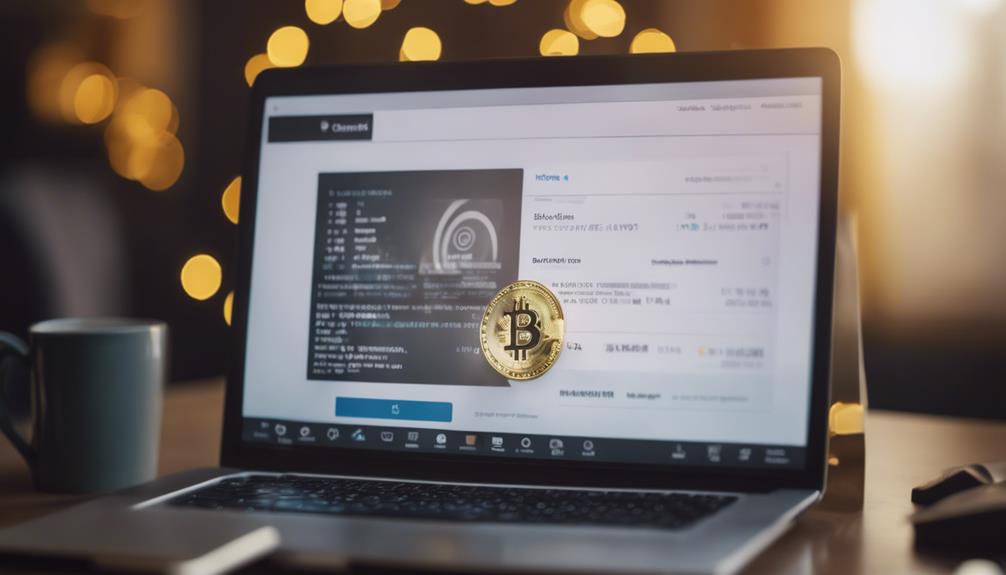When looking to purchase Bitcoin within a Roth IRA, it is important to select a custodian such as BitcoinIRA or iTrustCapital for your crypto investments. Make sure the custodian allows cryptocurrencies in a Roth IRA before funding your account to explore the tax-free growth potential of Bitcoin for retirement. Be sure to confirm the security measures in place for storing your Bitcoin and understand the IRS regulations and tax implications of investing in Bitcoin. Adding Bitcoin to your Roth IRA can help hedge market risks and increase long-term wealth. Consider consulting with a financial advisor to gain insights on tax implications and risk management. Evaluate the risks associated with cryptocurrency and create a long-term strategy that aligns with your financial goals. Find out more about maximizing the potential of your Roth IRA with Bitcoin.
Key Takeaways
- Verify eligibility for a Roth IRA and choose a crypto-friendly custodian.
- Open a self-directed Roth IRA allowing cryptocurrency investments.
- Fund the account to start buying Bitcoin for tax-free growth.
- Transfer funds securely and comply with IRS regulations for tax benefits.
- Understand tax implications and regulations for Bitcoin investments in a Roth IRA.
Roth IRA Eligibility for Bitcoin Investment

Investors can explore Bitcoin investment opportunities within a Roth IRA due to the flexibility they offer for diversifying portfolios. With a Roth IRA, individuals can invest in Bitcoin and other cryptocurrencies using after-tax dollars.
One key benefit is the potential for Bitcoin investments to grow tax-free within the Roth IRA. This means that any gains made from Bitcoin investments can be enjoyed without worrying about taxes eating into profits.
Additionally, when it comes time to make withdrawals from the Roth IRA, including any gains from Bitcoin, these withdrawals can also be tax-free under certain conditions. This tax-free advantage can be particularly appealing for those looking to secure their retirement portfolios.
Choosing a Crypto-Friendly Custodian

When selecting a custodian for your crypto investments in a Roth IRA, prioritize verifying their regulatory credentials and industry reputation to safeguard against potential scams in the market.
Look for a self-directed IRA custodian that allows cryptocurrency investments, ensuring they're regulated and licensed to offer crypto-friendly Roth IRA services. Consider custodians like BitcoinIRA, iTrustCapital, CoinIRA, BitIRA, and Equity Trust for your crypto investments. These reputable companies provide a secure platform for managing your digital assets within a retirement account.
Opening a Self-Directed Roth IRA
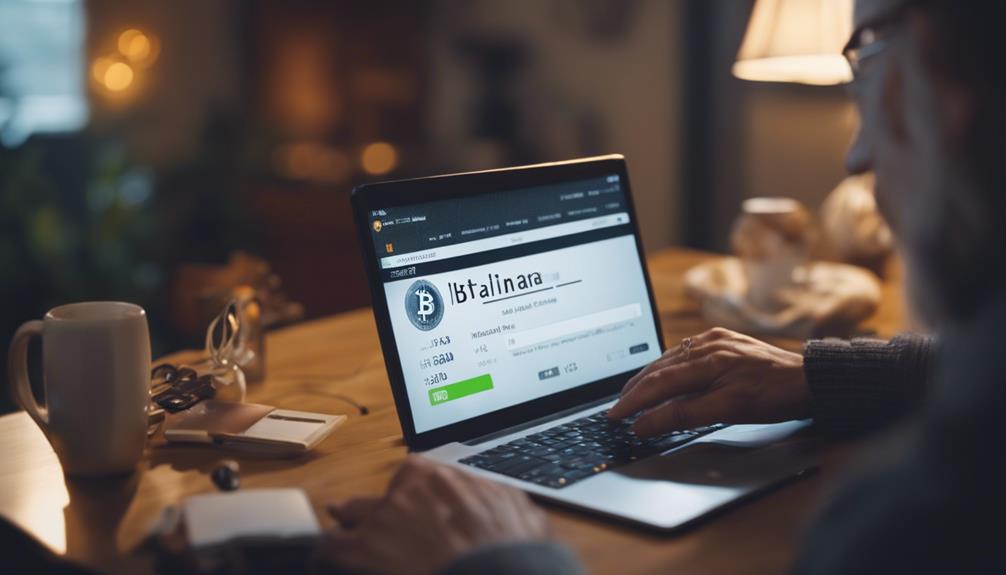
When contemplating opening a self-directed Roth IRA, it's crucial to understand the eligibility requirements for a Roth IRA, the process of setting up the account, and how to fund your investment.
By meeting the Roth IRA eligibility criteria, selecting a custodian, and funding your account, you can start investing in cryptocurrencies like Bitcoin for your retirement.
Taking the necessary steps to open a self-directed Roth IRA paves the way for alternative investments and potential growth within a tax-advantaged retirement account.
Roth IRA Eligibility Requirements
To open a self-directed Roth IRA, individuals must meet specific eligibility requirements, such as having earned income and adhering to IRS-set income limits. When considering a self-directed Roth IRA for investing in Bitcoin and other alternative assets, here are some key eligibility requirements to bear in mind:
- Having earned income is a prerequisite.
- Individuals must meet income limits as per IRS guidelines.
- Contribution limits are set at $6,000 per year ($7,000 for those over 50).
- Enjoy the freedom of control over investment choices within this tax-advantaged retirement account.
Setting Up Account
We can initiate the process of opening a self-directed Roth IRA by selecting a custodian that allows for cryptocurrency investments, facilitating the purchase of Bitcoin within the account. When choosing a custodian, make sure they support alternative assets like Bitcoin within the IRA structure. Provide necessary personal information and align investment goals during the account setup. Below is a table summarizing key steps in setting up a self-directed Roth IRA:
| Steps to Setting Up a Self-Directed Roth IRA |
|---|
| 1. Choose a custodian that permits cryptocurrency investments |
| 2. Verify support for alternative assets like Bitcoin |
| 3. Provide personal information and investment goals |
| 4. Open the self-directed Roth IRA |
| 5. Proceed to fund the account |
Funding Your Investment
Funding our investment in Bitcoin within a Roth IRA involves contributing after-tax dollars to the account, ensuring the self-directed provider allows for cryptocurrency investments. Here are some key points to keep in mind when funding your investment:
- Confirm that your self-directed Roth IRA provider permits cryptocurrency investments.
- Allocate a portion of your after-tax dollars towards purchasing Bitcoin.
- Explore the flexibility of self-directed accounts for investing in alternative assets like Bitcoin.
- Strategically incorporate Bitcoin into your retirement investment plan to diversify your portfolio.
Transferring Funds for Bitcoin Purchase

When transferring funds for Bitcoin purchase in a Roth IRA, we need to make sure the custodian supports cryptocurrency investments. This step is vital to maintain compliance with IRS regulations and safeguard the tax advantages of the retirement account.
Funding Your Account
To transfer funds for purchasing Bitcoin within your Roth IRA, consider initiating a seamless transfer from your traditional retirement account to a self-directed Roth IRA that permits cryptocurrency investments. When funding your account:
- Verify your chosen custodian or platform allows Bitcoin purchases in a Roth IRA.
- Adhere to IRS guidelines when transferring funds between retirement accounts to avoid tax implications.
- Confirm the security measures and storage options for Bitcoin within your Roth IRA are robust.
- Understand any associated fees for transferring funds and buying Bitcoin in your Roth IRA to maintain transparency in your investments.
Setting up Wallet
After confirming that your Roth IRA is funded, the next step involves establishing a cryptocurrency wallet compatible with your custodian's platform for purchasing Bitcoin. To facilitate the secure transfer of funds, you'll need to move the desired amount from your Roth IRA account to the designated cryptocurrency wallet. It's vital to verify the transaction details meticulously to guarantee accuracy before proceeding with the Bitcoin purchase. Double-check that the wallet address provided for transferring funds is correct to prevent any potential loss of funds. By adhering to IRS regulations and following these steps diligently, you can navigate the process smoothly and securely.
| Steps to Setting up Wallet | |
|---|---|
| 1. Fund your Roth IRA. | 2. Set up a crypto wallet. |
| 3. Transfer funds securely. | 4. Verify transaction details. |
| 5. Confirm wallet address. | 6. Proceed with Bitcoin purchase. |
Tax Implications and Regulations

Considering the property classification of Bitcoin by the IRS since 2014, tax implications and regulations play a significant role in purchasing Bitcoin within a Roth IRA. When delving into the world of Bitcoin in a retirement account, here are a few key points to keep in mind:
- Tax Treatment: Bitcoin is treated as property, so transactions within a Roth IRA may have tax consequences.
- Prohibited Direct Contribution: Directly contributing Bitcoin to a Roth IRA isn't allowed; it must be bought within the account.
- Traditional IRA Limitations: Traditional IRA providers may not permit the inclusion of Bitcoin in their accounts, limiting your investment options.
- Self-Directed IRAs: Opting for a self-directed IRA offers more flexibility, allowing alternative assets like Bitcoin to be included in your retirement portfolio.
Understanding these tax implications and regulations is essential for making informed decisions when incorporating Bitcoin into your Roth IRA. By being aware of the rules and options available, you can navigate this space with confidence and freedom.
Compliance With IRS Rules
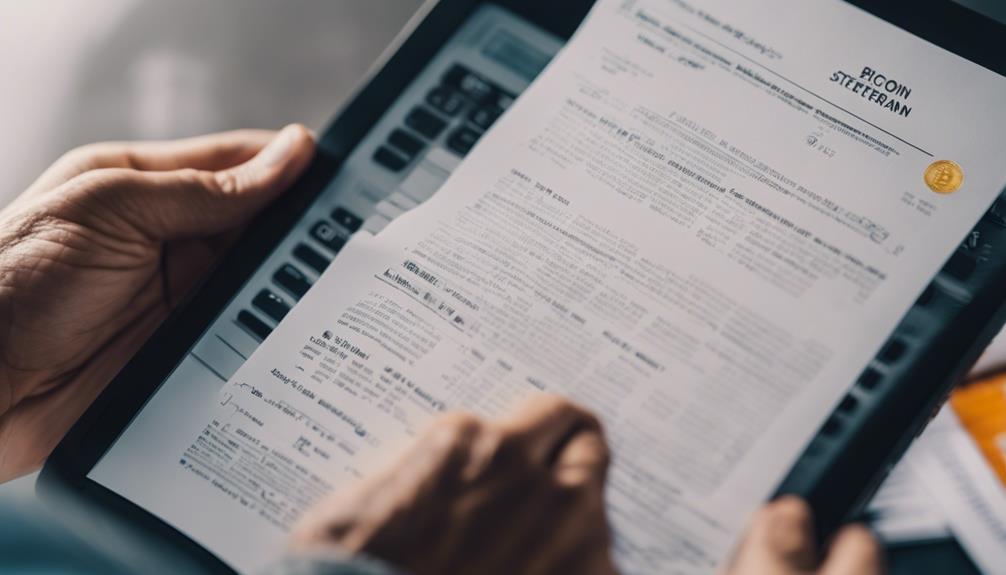
Managing the purchase of Bitcoin within a Roth IRA requires strict compliance with IRS rules governing retirement accounts, particularly in regard to the treatment of crypto assets. The IRS classifies cryptocurrencies like Bitcoin as property, permitting their inclusion in self-directed IRAs.
While direct contributions of Bitcoin into a Roth IRA aren't allowed, purchasing it within the account is an option. It's important to understand and follow IRS regulations when buying Bitcoin in a Roth IRA to avoid penalties or disqualification of the account.
Traditional IRA providers may have restrictions on adding cryptocurrency, making self-directed IRAs a more flexible option for those interested in diversifying their retirement portfolio with digital assets.
Diversifying Your Roth IRA Investments

Diversifying our Roth IRA investments with Bitcoin can provide opportunities for exposure to a high-growth asset class. When considering diversification within our Roth IRA, it's important to assess our risk tolerance and long-term investment goals.
Here are some key points to keep in mind:
- Adding Bitcoin to our Roth IRA can help hedge against traditional market risks.
- Including Bitcoin in our Roth IRA can potentially enhance long-term wealth accumulation.
- Investing in Bitcoin within a Roth IRA can provide tax-free growth opportunities.
- Evaluating risk tolerance is vital as we seek to diversify our investments with Bitcoin.
Working With a Financial Advisor

When seeking to integrate Bitcoin into a Roth IRA, collaborating with a financial advisor can offer detailed insights and guidance. Financial advisors can provide personalized advice on the tax implications, investment strategies, and long-term effects of holding Bitcoin in a retirement account.
They can help navigate the complexities of setting up a self-directed IRA for Bitcoin investments, ensuring compliance with IRS regulations. Advisors also assist in evaluating how Bitcoin holdings may impact overall retirement portfolio diversification and risk management.
Working with a financial advisor can help individuals make informed decisions about purchasing Bitcoin in a Roth IRA and develop a thorough retirement investment strategy. By leveraging the expertise of a financial advisor, you can gain a better understanding of how Bitcoin fits into your retirement planning, potentially maximizing growth while managing risk effectively.
Understanding Cryptocurrency Risks

Understanding the risks associated with cryptocurrencies is essential before contemplating the purchase of Bitcoin in a Roth IRA. Here are some key points to keep in mind:
- High Volatility: The crypto market is known for its extreme price fluctuations, which can impact the value of Bitcoin held in a Roth IRA.
- Tax Implications: While Roth IRAs offer tax advantages, high fees associated with crypto IRAs may negate some of these benefits, adding a layer of financial risk to take into account.
- Professional Advice: Seeking guidance from a financial advisor is important to assess your risk tolerance and determine if holding Bitcoin in a Roth IRA aligns with your long-term financial goals.
- Market Unpredictability: Cryptocurrency investments can be highly unpredictable, making it important for individuals to stay informed and prepared for potential losses or gains.
Before delving into the crypto space within your Roth IRA, understanding these risks is necessary to make informed financial decisions that align with your individual needs.
Long-Term Strategy for Bitcoin in Roth IRA
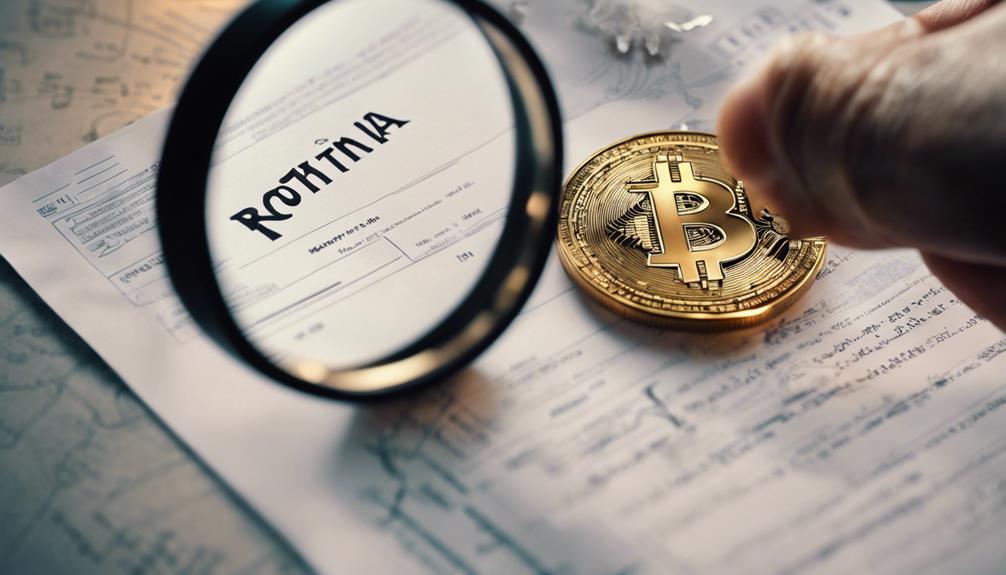
Before moving forward with investing in Bitcoin in a Roth IRA, it's important to establish a long-term strategy that aligns with our financial goals and risk tolerance. When considering a Bitcoin IRA, the focus is on tax-free growth, wealth accumulation, and diversification within your retirement portfolio. By incorporating Bitcoin into your Roth IRA, you have the potential to benefit from the high-growth nature of this asset class over the long term. Properly storing and securing your Bitcoin investments within the Roth IRA structure is essential for safeguarding your financial future.
To help you better understand the benefits of a long-term strategy for Bitcoin in a Roth IRA, let's explore the key aspects in the table below:
| Key Aspect | Description | Importance |
|---|---|---|
| Tax-Free Growth | Bitcoin in a Roth IRA grows tax-free, maximizing your investment potential. | High |
| Wealth Accumulation | Long-term strategy allows for the accumulation of wealth through Bitcoin investments. | Critical |
| Diversification | Bitcoin adds diversification to your retirement portfolio, reducing overall risk. | Significant |
| Storing and Securing | Proper storage and security measures are essential to protect your Bitcoin holdings within a Roth IRA. | Essential |
Understanding the tax implications and compliance requirements is key to successfully integrating Bitcoin into your Roth IRA for long-term financial growth.
Frequently Asked Questions
Does Coinbase Offer Roth Ira?
Coinbase doesn't offer Roth IRAs directly. However, users can buy, sell, and store Bitcoin on the platform.
To buy Bitcoin in a Roth IRA, one can use a self-directed IRA provider supporting cryptocurrency investments and link it to their Coinbase account. Self-directed IRAs allow investing in alternative assets like Bitcoin, offering a way to hold cryptocurrency in a retirement account.
It's important to select a reputable self-directed IRA custodian aligning with your investment goals.
What IRA Allows Bitcoin?
When considering what IRA allows Bitcoin, it's crucial to look into self-directed IRAs like Bitcoin IRA, iTrustCapital, and BitIRA. These platforms offer the flexibility to include Bitcoin in your retirement account.
Conversely, traditional IRA providers may not allow Bitcoin investments. Companies like Equity Trust specifically cater to holding Bitcoin in Roth IRAs, offering the potential for tax-free growth.
Understanding IRS regulations treating cryptocurrency as property can guide your investment decisions.
What Is the Minimum Deposit for a Bitcoin Ira?
The minimum deposit for a Bitcoin IRA can vary, typically falling between $1,000 to $3,000 with some providers. However, certain companies may require a higher initial investment, like $10,000 or more. Alternatively, some custodians offer Bitcoin IRAs with no minimum deposit requirement, enabling investors to start with smaller amounts.
It's essential to compare these deposit requirements to align with your financial objectives when considering investing in Bitcoin through a Roth IRA.
Can I Buy a Bitcoin ETF in My Ira?
Yes, we can buy a Bitcoin ETF in our IRA if it's listed on a supported exchange and meets our custodian's criteria. Confirm availability with our IRA provider, as not all custodians allow this investment.
Investing in a Bitcoin ETF through our IRA provides exposure to Bitcoin in a regulated manner without directly holding the cryptocurrency.
Consulting a financial advisor can help us understand the risks and implications of this investment strategy.
What Are the Benefits of Buying Bitcoin in a Roth IRA?
Investing in a Roth IRA can be a smart move, especially when it comes to bitcoin IRAs workings. This retirement account offers tax-free growth and withdrawals, making it an ideal option for growing your cryptocurrency investment. By investing in bitcoin within a Roth IRA, you can potentially maximize your gains while minimizing your tax burden.
Conclusion
To sum up, purchasing Bitcoin in a Roth IRA can revolutionize your retirement savings. By leveraging the tax advantages and potential growth of cryptocurrency, you can ensure a more financially secure future.
Don't overlook this chance to diversify your portfolio and potentially boost your wealth in the long run. Begin exploring your options today and consider partnering with a financial advisor to maximize the potential of this unique investment strategy.


